Leadership Analysis: Skills, Styles, Motivation, and Techniques
VerifiedAdded on 2023/04/04
|16
|873
|118
Report
AI Summary
This report provides an overview of leadership, differentiating it from management and exploring the essential skills and attributes of effective leaders. It examines various leadership styles, including authoritarian, democratic, strategic, transformational, team, laissez-faire, and transactional approaches, highlighting their applications in different situations. The report further delves into employee motivation, discussing Maslow's hierarchy of needs and Herzberg's motivation-hygiene theory, and explores techniques to enhance employee engagement and performance. The content is supported by references to academic research, providing a comprehensive understanding of leadership and motivation in the workplace.

Working with leading
people
people
Paraphrase This Document
Need a fresh take? Get an instant paraphrase of this document with our AI Paraphraser
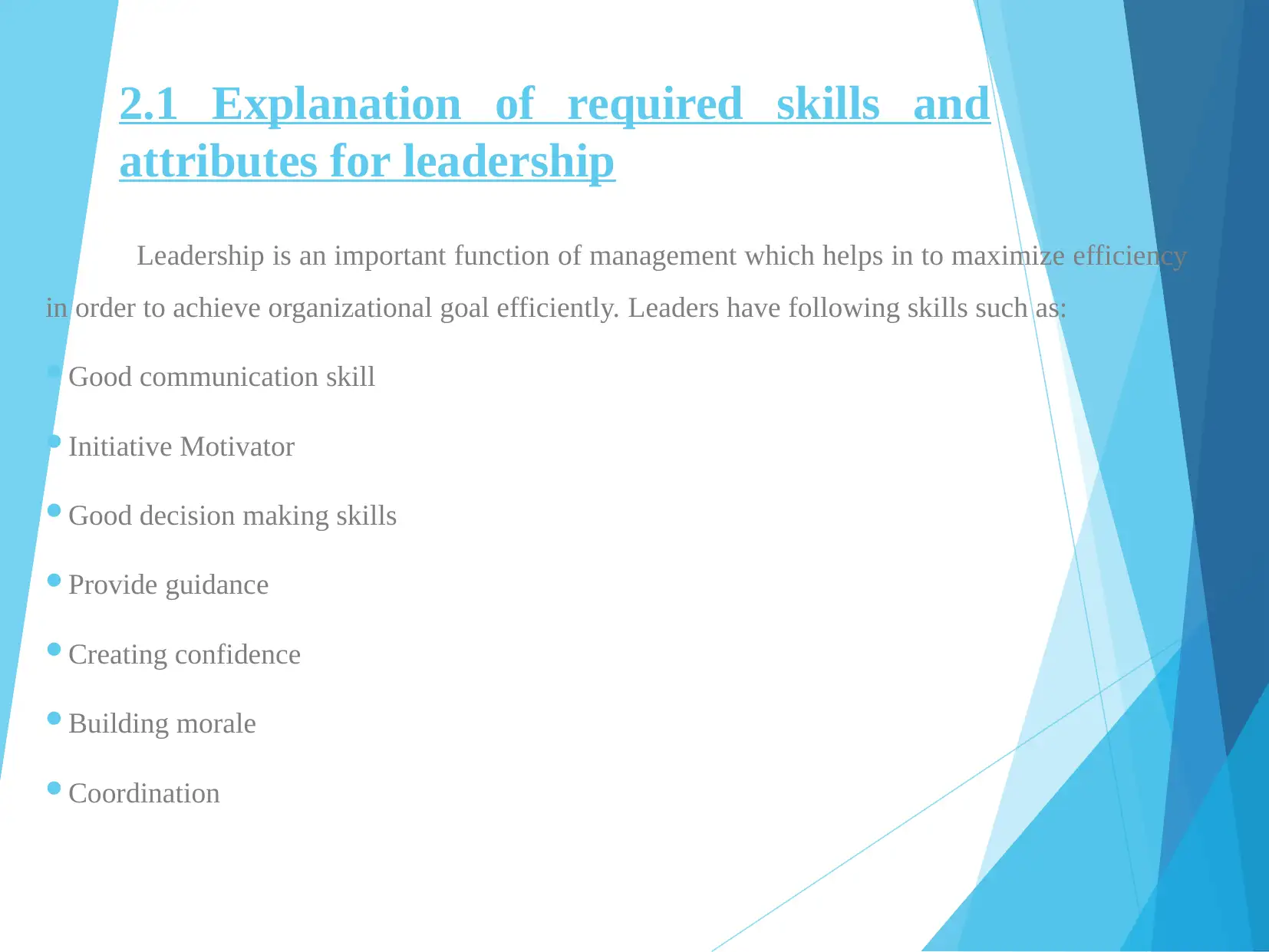
2.1 Explanation of required skills and
attributes for leadership
Leadership is an important function of management which helps in to maximize efficiency
in order to achieve organizational goal efficiently. Leaders have following skills such as:
Good communication skill
Initiative Motivator
Good decision making skills
Provide guidance
Creating confidence
Building morale
Coordination
attributes for leadership
Leadership is an important function of management which helps in to maximize efficiency
in order to achieve organizational goal efficiently. Leaders have following skills such as:
Good communication skill
Initiative Motivator
Good decision making skills
Provide guidance
Creating confidence
Building morale
Coordination
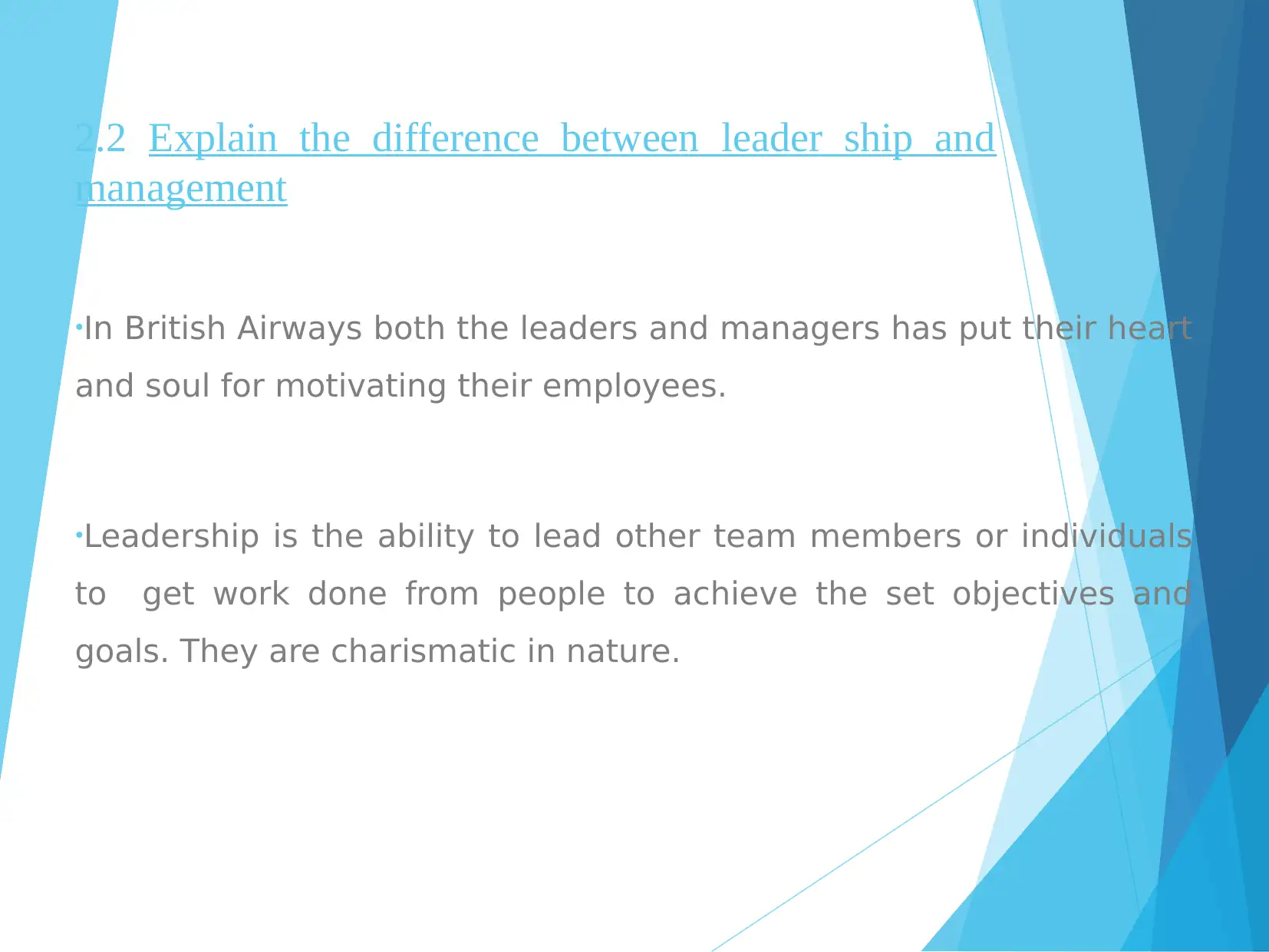
2.2 Explain the difference between leader ship and
management
•In British Airways both the leaders and managers has put their heart
and soul for motivating their employees.
•Leadership is the ability to lead other team members or individuals
to get work done from people to achieve the set objectives and
goals. They are charismatic in nature.
management
•In British Airways both the leaders and managers has put their heart
and soul for motivating their employees.
•Leadership is the ability to lead other team members or individuals
to get work done from people to achieve the set objectives and
goals. They are charismatic in nature.
⊘ This is a preview!⊘
Do you want full access?
Subscribe today to unlock all pages.

Trusted by 1+ million students worldwide
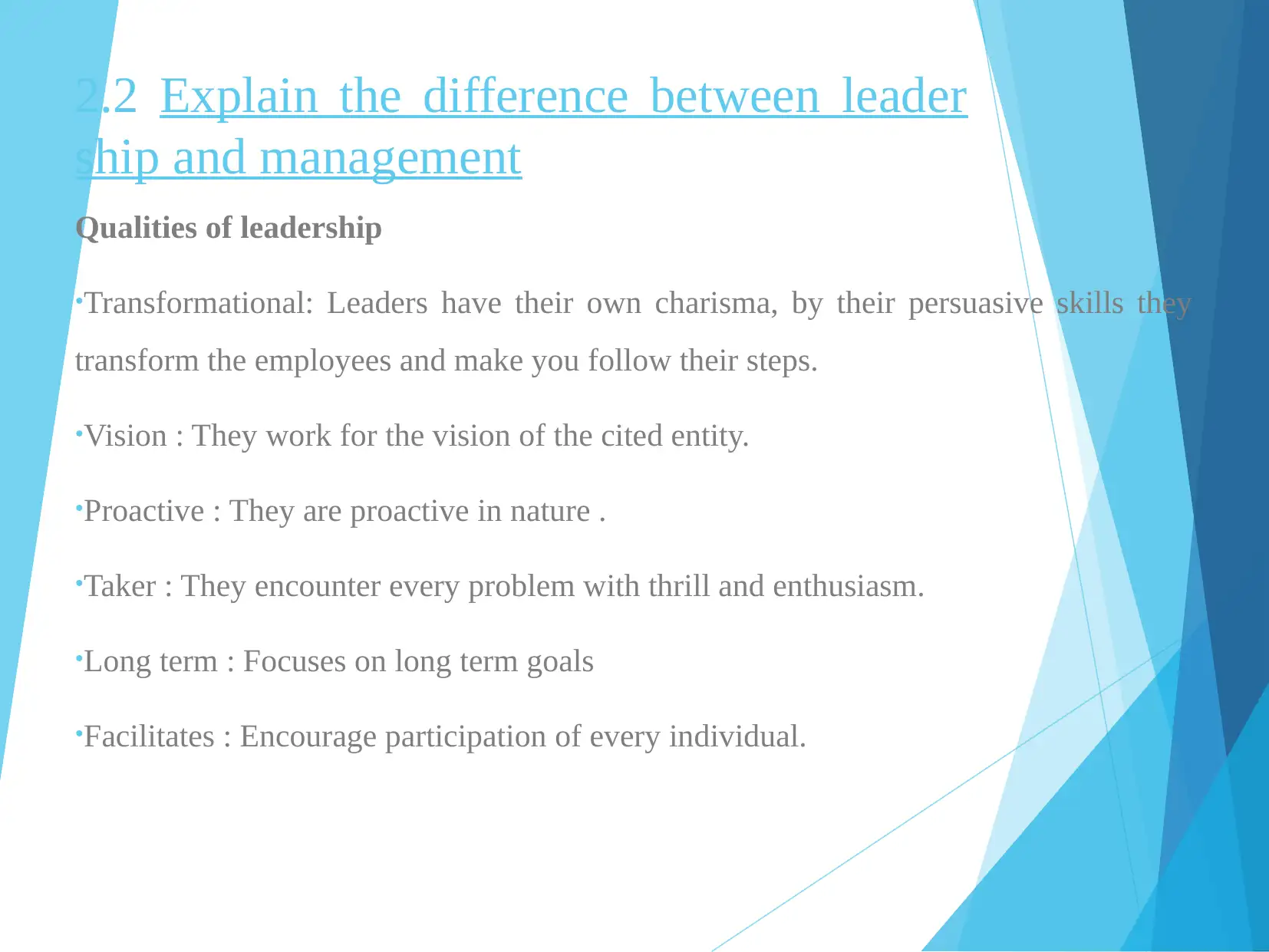
2.2 Explain the difference between leader
ship and management
Qualities of leadership
•Transformational: Leaders have their own charisma, by their persuasive skills they
transform the employees and make you follow their steps.
•Vision : They work for the vision of the cited entity.
•Proactive : They are proactive in nature .
•Taker : They encounter every problem with thrill and enthusiasm.
•Long term : Focuses on long term goals
•Facilitates : Encourage participation of every individual.
ship and management
Qualities of leadership
•Transformational: Leaders have their own charisma, by their persuasive skills they
transform the employees and make you follow their steps.
•Vision : They work for the vision of the cited entity.
•Proactive : They are proactive in nature .
•Taker : They encounter every problem with thrill and enthusiasm.
•Long term : Focuses on long term goals
•Facilitates : Encourage participation of every individual.
Paraphrase This Document
Need a fresh take? Get an instant paraphrase of this document with our AI Paraphraser
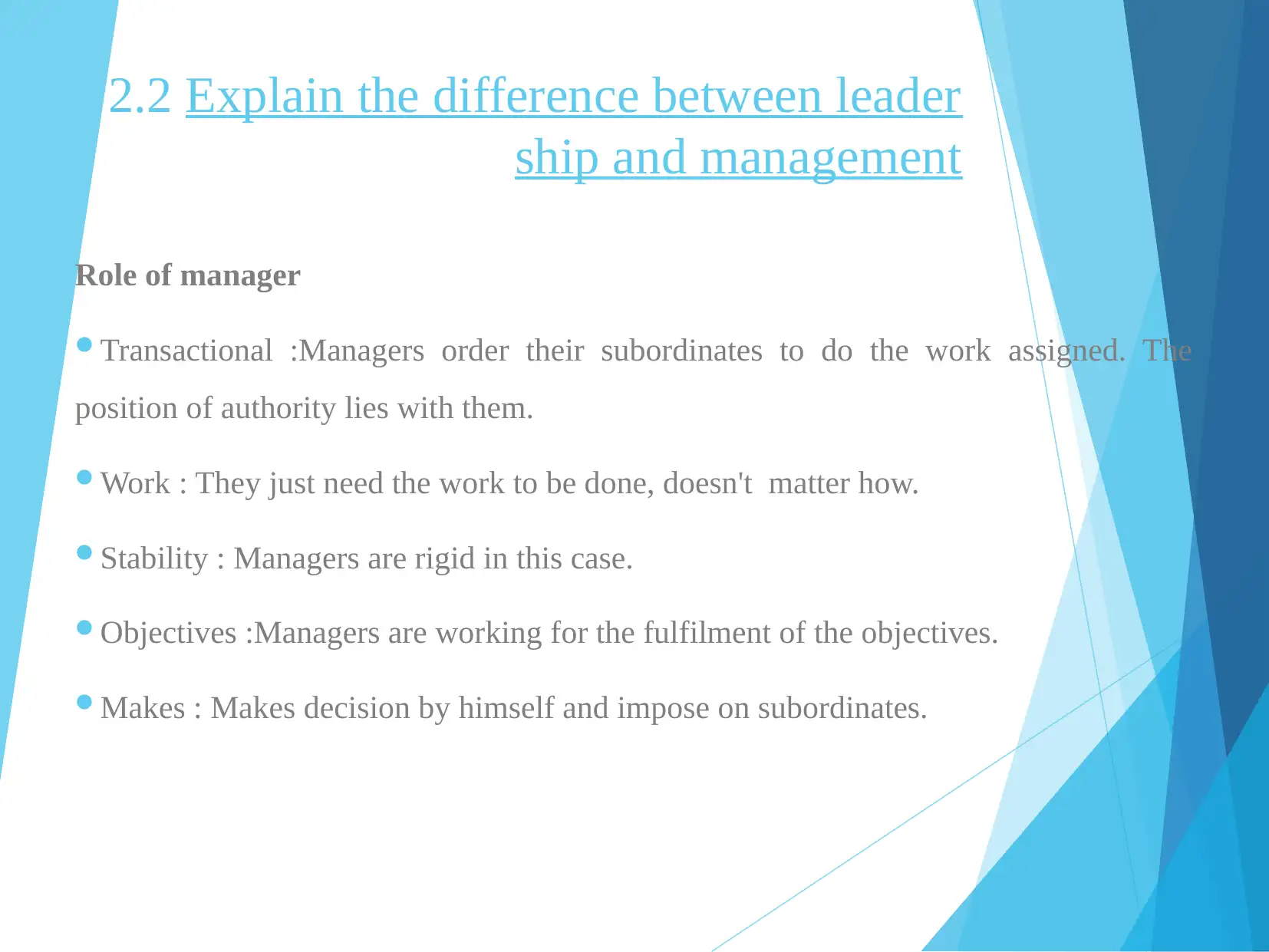
2.2 Explain the difference between leader
ship and management
Role of manager
Transactional :Managers order their subordinates to do the work assigned. The
position of authority lies with them.
Work : They just need the work to be done, doesn't matter how.
Stability : Managers are rigid in this case.
Objectives :Managers are working for the fulfilment of the objectives.
Makes : Makes decision by himself and impose on subordinates.
ship and management
Role of manager
Transactional :Managers order their subordinates to do the work assigned. The
position of authority lies with them.
Work : They just need the work to be done, doesn't matter how.
Stability : Managers are rigid in this case.
Objectives :Managers are working for the fulfilment of the objectives.
Makes : Makes decision by himself and impose on subordinates.
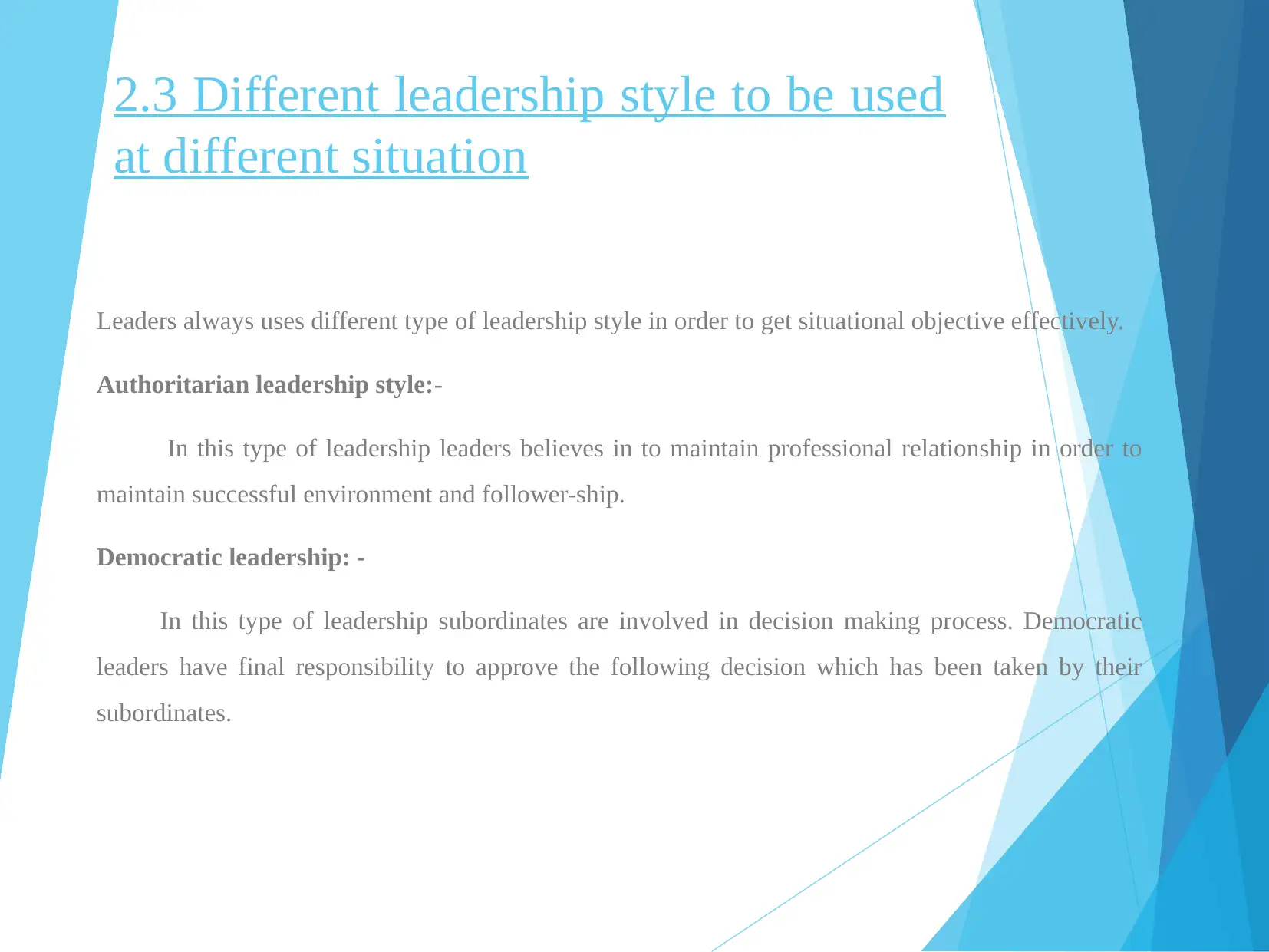
2.3 Different leadership style to be used
at different situation
Leaders always uses different type of leadership style in order to get situational objective effectively.
Authoritarian leadership style:-
In this type of leadership leaders believes in to maintain professional relationship in order to
maintain successful environment and follower-ship.
Democratic leadership: -
In this type of leadership subordinates are involved in decision making process. Democratic
leaders have final responsibility to approve the following decision which has been taken by their
subordinates.
at different situation
Leaders always uses different type of leadership style in order to get situational objective effectively.
Authoritarian leadership style:-
In this type of leadership leaders believes in to maintain professional relationship in order to
maintain successful environment and follower-ship.
Democratic leadership: -
In this type of leadership subordinates are involved in decision making process. Democratic
leaders have final responsibility to approve the following decision which has been taken by their
subordinates.
⊘ This is a preview!⊘
Do you want full access?
Subscribe today to unlock all pages.

Trusted by 1+ million students worldwide
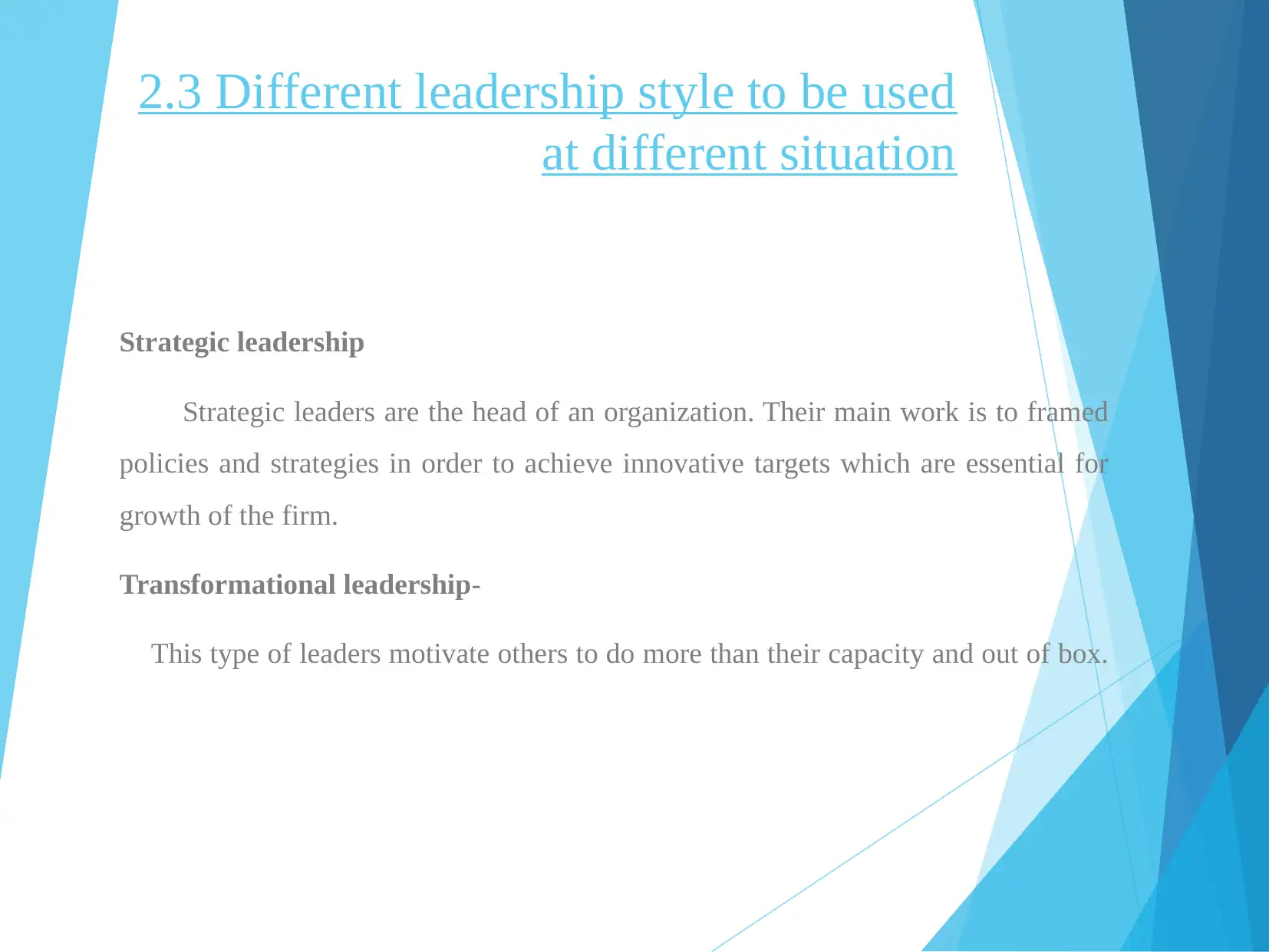
2.3 Different leadership style to be used
at different situation
Strategic leadership
Strategic leaders are the head of an organization. Their main work is to framed
policies and strategies in order to achieve innovative targets which are essential for
growth of the firm.
Transformational leadership-
This type of leaders motivate others to do more than their capacity and out of box.
at different situation
Strategic leadership
Strategic leaders are the head of an organization. Their main work is to framed
policies and strategies in order to achieve innovative targets which are essential for
growth of the firm.
Transformational leadership-
This type of leaders motivate others to do more than their capacity and out of box.
Paraphrase This Document
Need a fresh take? Get an instant paraphrase of this document with our AI Paraphraser
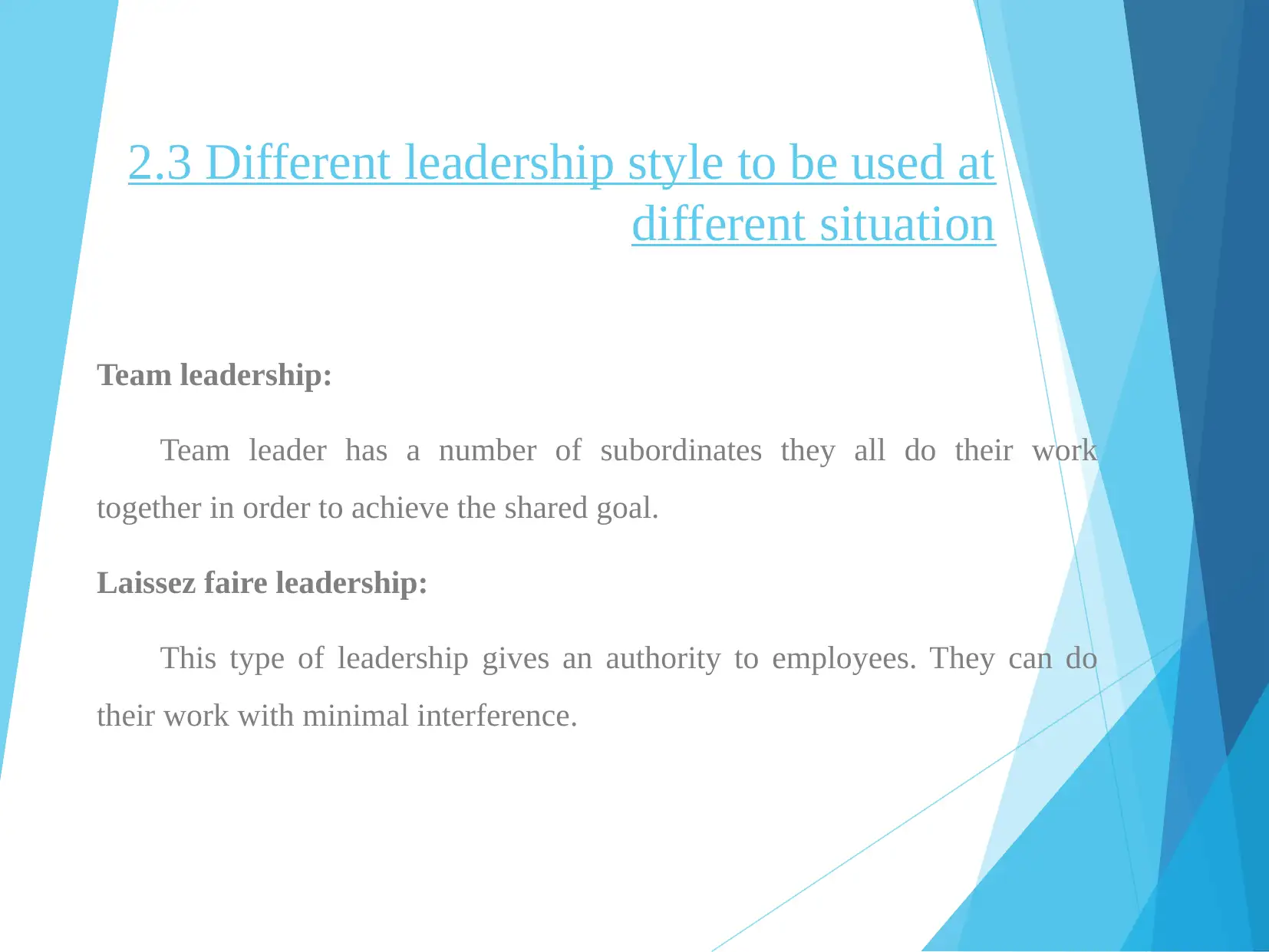
2.3 Different leadership style to be used at
different situation
Team leadership:
Team leader has a number of subordinates they all do their work
together in order to achieve the shared goal.
Laissez faire leadership:
This type of leadership gives an authority to employees. They can do
their work with minimal interference.
different situation
Team leadership:
Team leader has a number of subordinates they all do their work
together in order to achieve the shared goal.
Laissez faire leadership:
This type of leadership gives an authority to employees. They can do
their work with minimal interference.
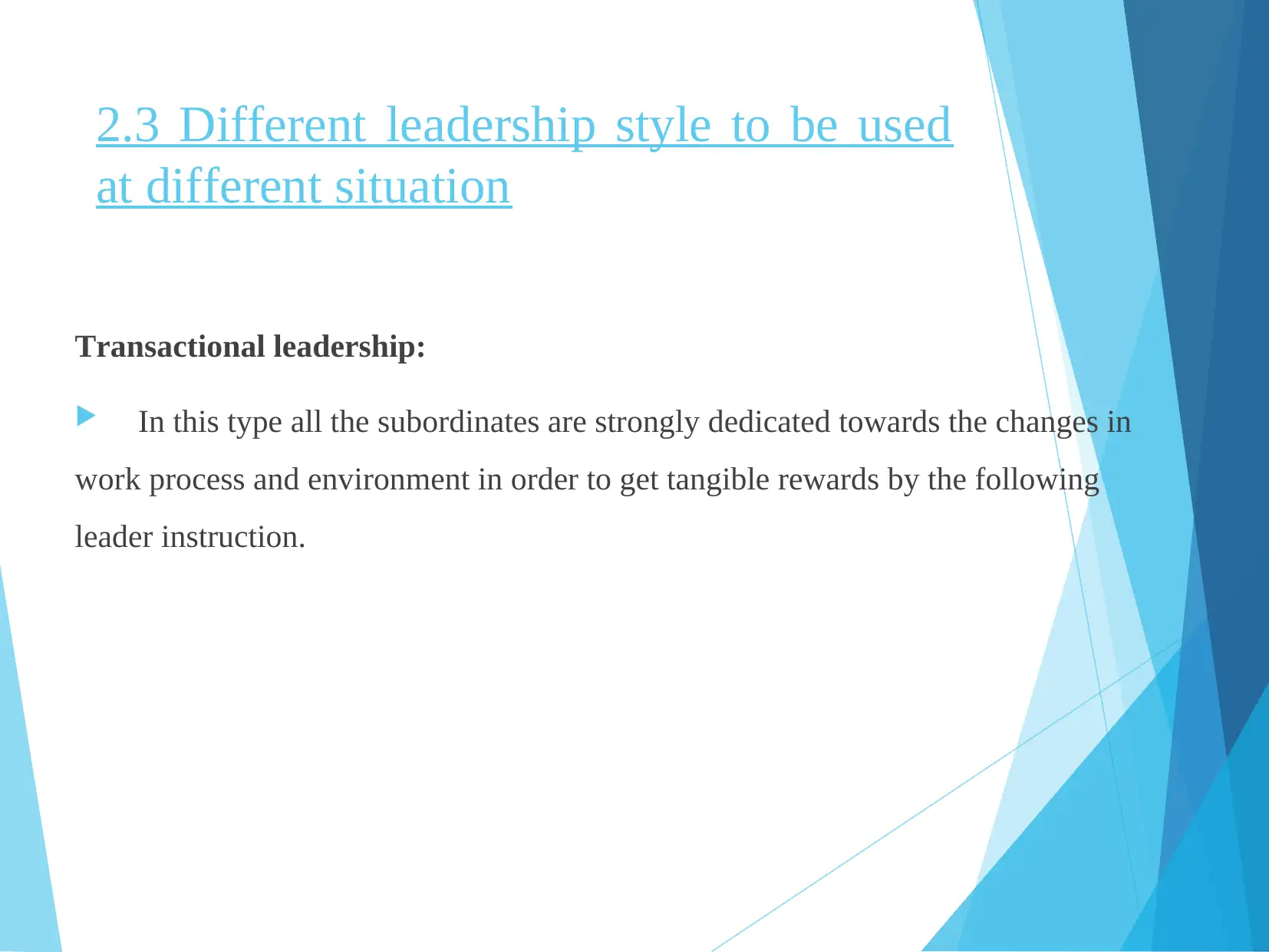
2.3 Different leadership style to be used
at different situation
Transactional leadership:
In this type all the subordinates are strongly dedicated towards the changes in
work process and environment in order to get tangible rewards by the following
leader instruction.
at different situation
Transactional leadership:
In this type all the subordinates are strongly dedicated towards the changes in
work process and environment in order to get tangible rewards by the following
leader instruction.
⊘ This is a preview!⊘
Do you want full access?
Subscribe today to unlock all pages.

Trusted by 1+ million students worldwide
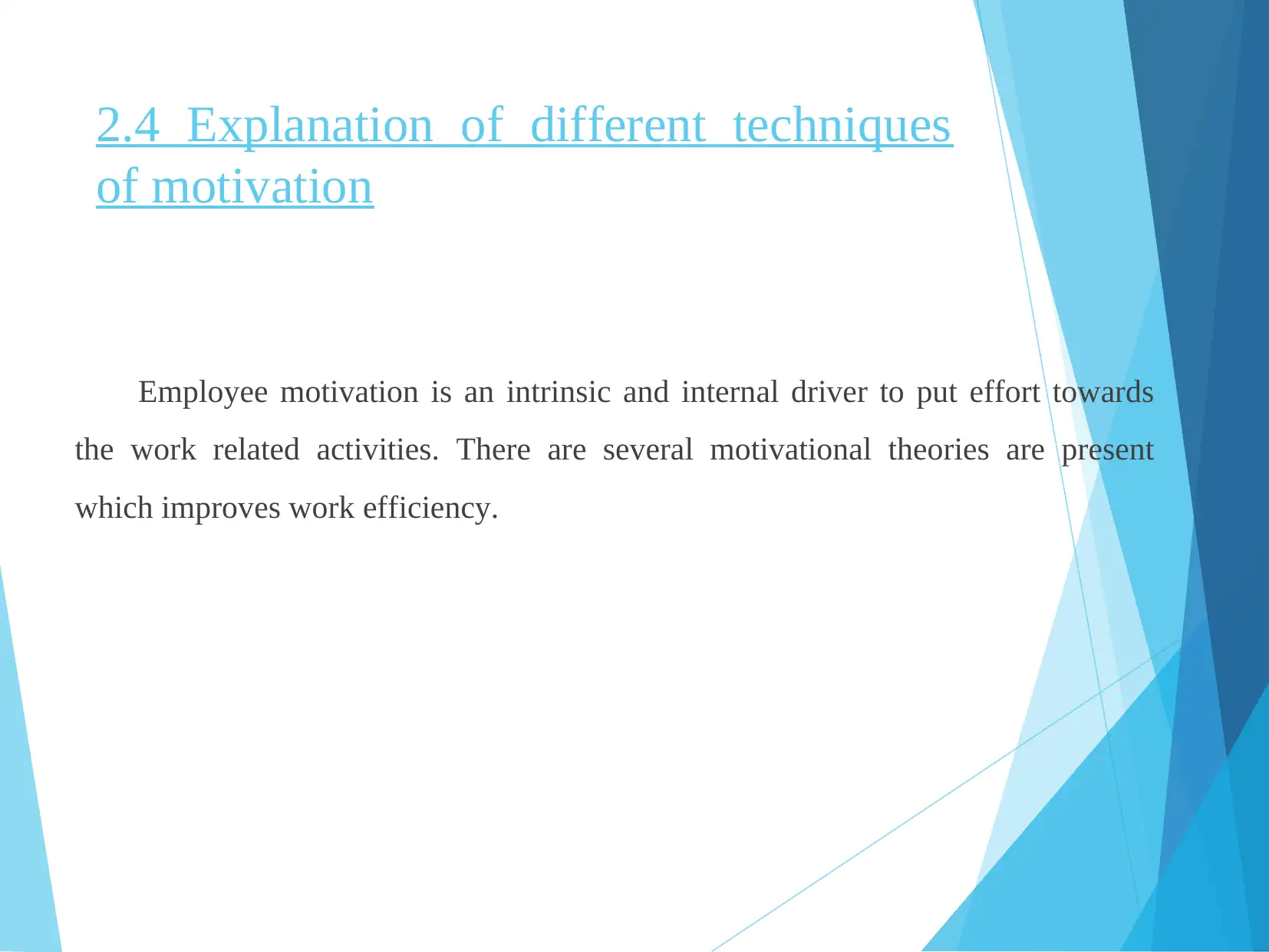
2.4 Explanation of different techniques
of motivation
Employee motivation is an intrinsic and internal driver to put effort towards
the work related activities. There are several motivational theories are present
which improves work efficiency.
of motivation
Employee motivation is an intrinsic and internal driver to put effort towards
the work related activities. There are several motivational theories are present
which improves work efficiency.
Paraphrase This Document
Need a fresh take? Get an instant paraphrase of this document with our AI Paraphraser
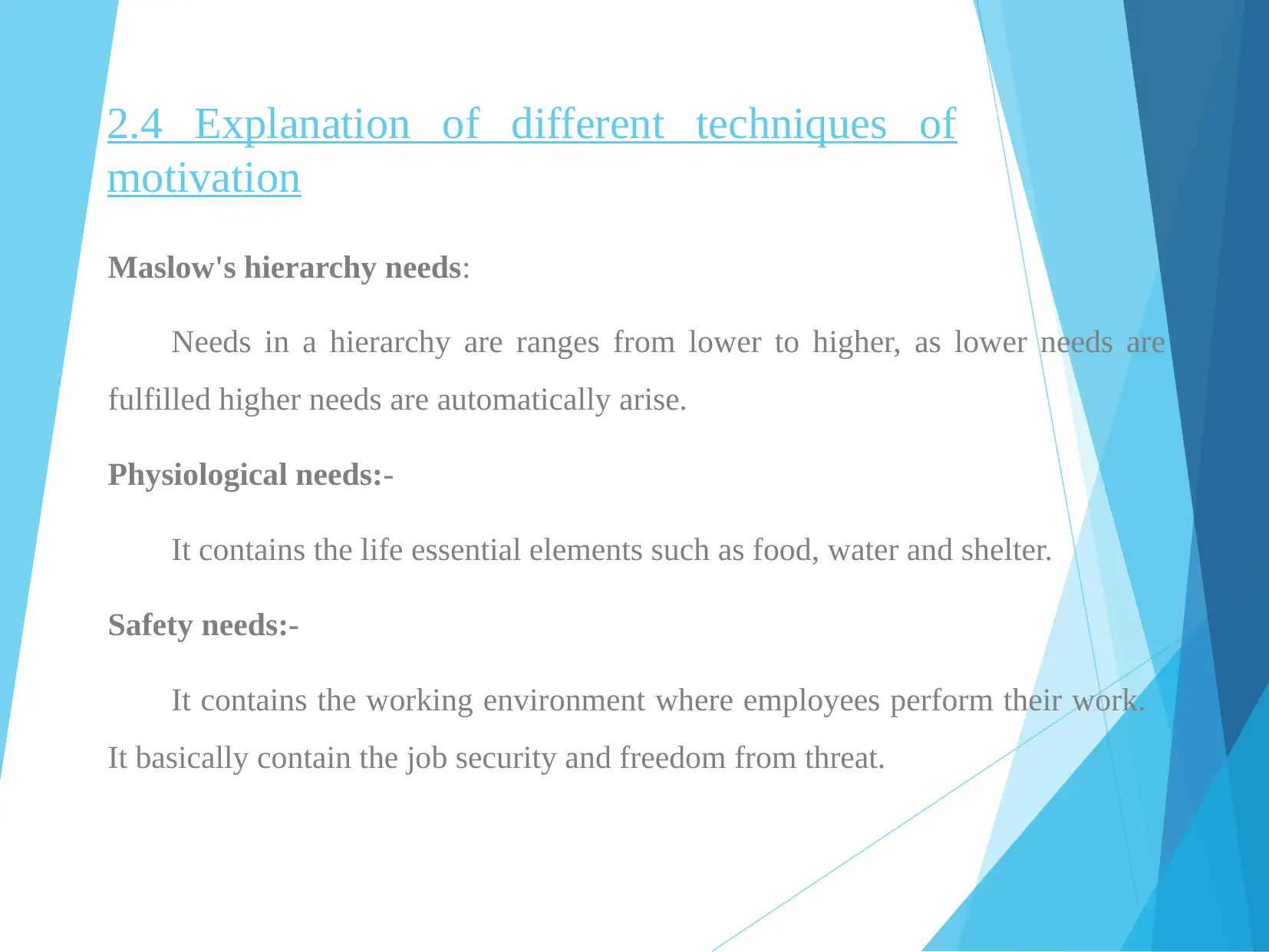
2.4 Explanation of different techniques of
motivation
Maslow's hierarchy needs:
Needs in a hierarchy are ranges from lower to higher, as lower needs are
fulfilled higher needs are automatically arise.
Physiological needs:-
It contains the life essential elements such as food, water and shelter.
Safety needs:-
It contains the working environment where employees perform their work.
It basically contain the job security and freedom from threat.
motivation
Maslow's hierarchy needs:
Needs in a hierarchy are ranges from lower to higher, as lower needs are
fulfilled higher needs are automatically arise.
Physiological needs:-
It contains the life essential elements such as food, water and shelter.
Safety needs:-
It contains the working environment where employees perform their work.
It basically contain the job security and freedom from threat.
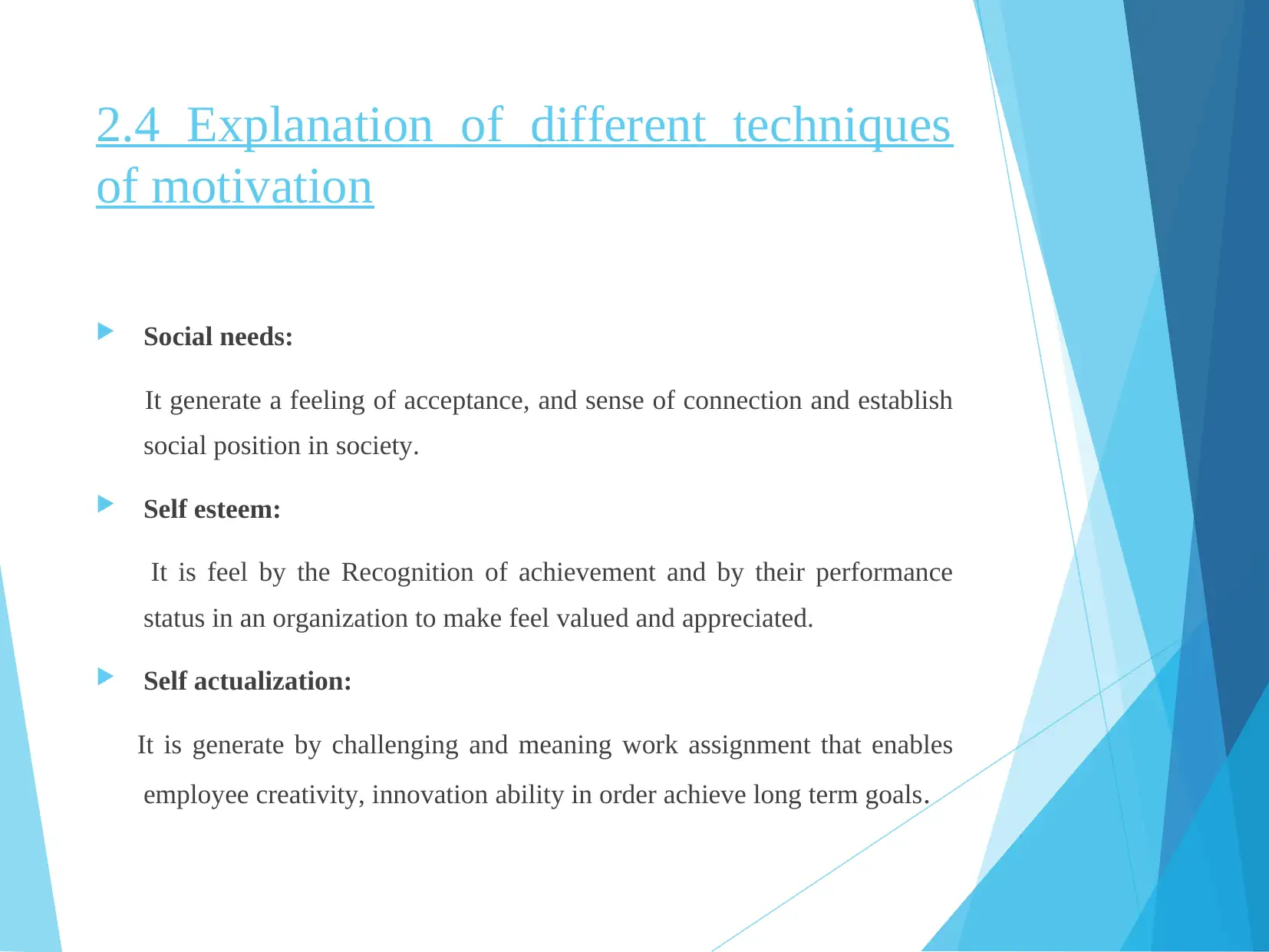
2.4 Explanation of different techniques
of motivation
Social needs:
It generate a feeling of acceptance, and sense of connection and establish
social position in society.
Self esteem:
It is feel by the Recognition of achievement and by their performance
status in an organization to make feel valued and appreciated.
Self actualization:
It is generate by challenging and meaning work assignment that enables
employee creativity, innovation ability in order achieve long term goals.
of motivation
Social needs:
It generate a feeling of acceptance, and sense of connection and establish
social position in society.
Self esteem:
It is feel by the Recognition of achievement and by their performance
status in an organization to make feel valued and appreciated.
Self actualization:
It is generate by challenging and meaning work assignment that enables
employee creativity, innovation ability in order achieve long term goals.
⊘ This is a preview!⊘
Do you want full access?
Subscribe today to unlock all pages.

Trusted by 1+ million students worldwide
1 out of 16
Related Documents
Your All-in-One AI-Powered Toolkit for Academic Success.
+13062052269
info@desklib.com
Available 24*7 on WhatsApp / Email
![[object Object]](/_next/static/media/star-bottom.7253800d.svg)
Unlock your academic potential
Copyright © 2020–2026 A2Z Services. All Rights Reserved. Developed and managed by ZUCOL.





